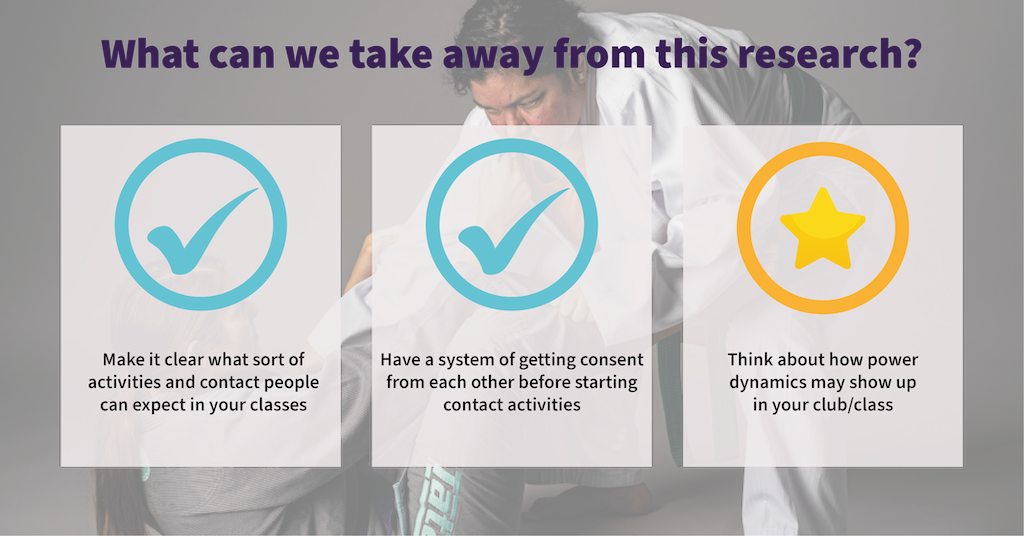
Our first research has been published! We looked at 53 papers that studied different martial arts, and found some common themes that came up repeatedly where they talked about women’s experiences of training with men.
Overall, these studies highlighted a lot of bad experiences but also showed that this is changing over time and martial arts can be a space that challenges gender stereotypes.
Of particular interest to us as clubs and coaches was the fact that many of these studies showed that the coach or instructor can be pivotal in shaping the attitudes their students have towards each other in a mixed gender environment.
Key points for clubs and coaches
In mixed gender clubs, men and women don’t necessarily have the same experiences, and it’s important for coaches to be aware of that.
Mixed gender training can negatively impact women because martial arts is traditionally seen as a men’s space, where men are more likely to be in positions of power, social expectations of women can be reinforced, and mixed gender contact can be uncomfortable – particularly when there is no opportunity to establish consent.
Coaches/instructors hold a lot of respect within clubs, and so have the power to set the tone for how students work with each other and how much these potential issues affect their female students.
What can we do with this knowledge?

Make sure that it’s clear what sort of activities/contact people should expect when they come to your class.

Implement and normalise a system of getting consent from each other before engaging in contact activities – and give women options to participate in a way that doesn’t involve mixed gender contact.

Think about how power dynamics may show up in your club/class – in relation to gender, but also in relation to other things like class and race:
- Who gets opportunities – to train, to spar, to compete and to advance, but also to speak, to demonstrate techniques, to be an example to others?
- Whose voices do you hear the most?
- Who gets to make decisions, and who is in a subservient volunteer role?
Want to know more?
The biggest theme that we found across these studies was that mixed gender contact – particularly where grappling is involved – can be uncomfortable or problematic.
This could take the following forms:
- women missing out on sparring opportunities if their predominantly male training partners are reluctant to be seen fighting with women
- women having bad experiences in sparring if their male training partners become more aggressive because they don’t want to be perceived as losing to a woman
- in martial arts, explicit consent to participate in contact activities is often not provided/asked for.
The studies also showed that martial arts are considered a man’s domain in which women can be excluded – or else feel pressure to conform to gender stereotypes or “earn” acceptance from men in order to be included.
The hierarchical structures within martial arts tend to put men in positions of power over women. Coaches and those in leadership positions are predominantly men, while women are often placed in service-oriented volunteer roles.
But it wasn’t all bad news – studies also showed that mixed gender training can have positive influences on women’s experiences in martial arts.
They showed that mixed gender training can:
- foster friendships, acceptance and respect between men and women
- help to challenge negative gender stereotypes
- empower women participating in the same training as men if it helps them to combat negative self-perceptions of being “weak”.


